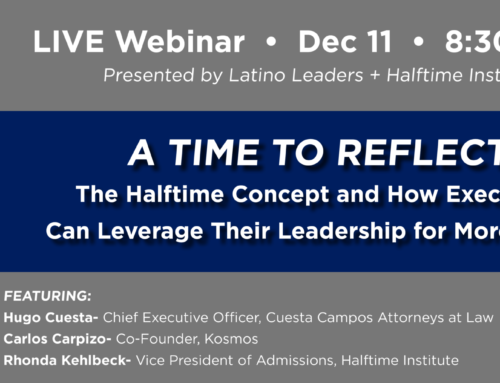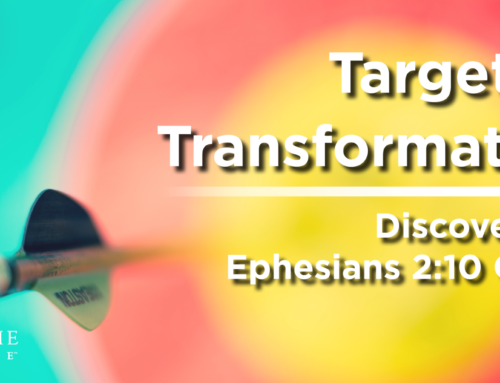You know you need a change. But how? And where to start?
You’re so used to running on adrenaline. Under the surface, you feel like you just want to escape.
You want peace. You want rest. And you want to devote yourself to something that truly matters.
You’re not alone. I felt that way when I went through a Halftime season, and we see it in many leaders who come through the Halftime Institute. We call it “smoldering discontent”.
But how do you go from smoldering to joyful and impactful?
You must first detox. If you’re not sure if you need to detox, read the first post in this series “4 Warning Signs You Need to Detox From the Rat Race“.
When I went through this season, I didn’t have the time or emotional bandwidth to slow down long enough to understand what was going on inside. I had no passion. Just a desire to escape. What I could not see while head down in my career was the pathology that was driving my success: my addiction to performance, my distorted view of God, or how my health was being damaged.
I had to re-orient my understanding and re-evaluate my life’s scorecard. Then, I had to align my daily, weekly and annual habits accordingly.
So how do you begin to detox in a healthy way even before you make a Halftime transition?
Here are 5 places to start. If you can put even one of these into practice in the next month, you’ll see a tremendous benefit.

- Schedule solitude – You must devote time to recalibrate your spiritual and emotional health before making big changes or starting something new. You can’t plan and drive your way through this one, my friend! Across our Halftime clients, we consistently hear that building in solitude with God has transformed them radically. Many clients take full-day or half-day solitary retreats a few times each year. Through solitude we are reminded of our identity in Christ and we are re-directed with compassion. When I first started this practice, I felt lost, but at just the right time through solitude and reflection, God would remind me of His care for me and put the next step in my mind.
APPLICATION: Take time right now and block out a day or afternoon when you can be alone with God.
- Unpack your limiting beliefs about God – Identifying where we have limiting beliefs about God is key. For me, I had to come to terms with the fact that God loves me, not because of what I can achieve for him but just because He is love itself. In one of our Halftime programs, we go through an exercise with our clients called “Limiting Beliefs” where we look at an area of your life where you feel stuck or discouraged. You ask yourself “What is it that I believe about this?” and then you ask “Well, what is true?” We look to Scripture to help us remember what is true, then we look at where that limiting belief might be originating, and we take time to unpack this in order to reframe our thinking. Truthful thinking leads to healthy emotions that lead to upright words and actions.
APPLICATION: Write down an area of your life where you feel stuck or discouraged. Now, write down what some of the limiting beliefs could be that might affect your thinking. Explore Scripture and what it says. Ask your spouse or a spiritually grounded friend to encourage and correct you in this area.

- Get counseling if needed – I met with a pastor friend after I left the company. As I shared about those demanding executive years, I broke down in tears without really knowing why. I didn’t have the emotional skills or objectivity necessary to figure myself out. The pastor recommended Christian counseling, which I promptly ignored. However, a year later, having tried everything I could to find emotional health, I finally humbled myself enough to admit I needed professional counseling.
APPLICATION: Schedule a consult with a counselor in your town to determine if a season of counseling could be helpful.
- Rebuild your health – Create a simple plan to eat healthy, get daily exercise, and optimal sleep. Putting these disciplines into practice will begin to clear your mind and help you gain perspective about what God has next for you.
APPLICATION: Determine what the #1 most important action is for you to improve your health. Meet with your doctor to get proper advice and craft a plan based on your current health.

- Develop a regular spiritual growth practice that suits your personality – This is the #1 most powerful habit for a transformed life. We’re all wired differently, but we’re wired for relationship with God. Sometimes we need to try something new and think beyond what works for other people. The main criteria for the practice is that it is not something to just check off. Rather, it is a time where we prayerfully ask God to take His Word and transform us from the inside out.
APPLICATION: What habits can you cultivate in your daily life that force you to slow down and listen to God? Is it a morning prayer & reading time? Is it getting out in nature while you walk your dog and devoting that time to prayer? Decide what feels right for you and commit to it for a season. Then evaluate the impact it is making on your life.
For me personally, I spend an hour in the morning reading Scripture, devotionals, various commentaries, and journaling prayerfully to process what God is putting on my heart and how I can respond in my life to what I’m learning. Twice each year, I go away for a more extended time of prayer and solitude and I read through my journals and reflect on what God is doing overall in me and what He is saying to me.
At the Halftime Institute, we help you make a game plan for the next season, but so much of the preparation for what is ahead happens at the heart level. It is both a practical and personal approach.
The secret sauce of true transformation happens in the coaching relationship. Your business won’t help you detox. They benefit from your rampant pace and productivity. The change happens when you can reflect in a completely confidential 1×1 setting, think your confusion out loud, and lay out the building blocks for both internal and external change.
Over the past 20 years, we’ve helped thousands of leaders make this transition, and we are here for you. If you’d like to explore this detox and transition process further, contact our Admissions Team.
Or view a real life example of Terry Mullen, who I worked with directly as he detoxed from the break-neck pace of his career in the NYC private equity world. Spoiler alert – he actually ended up staying and living out a new mission there. It was the detox process and the personal connection that made all the difference!






